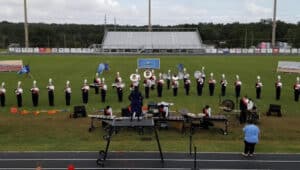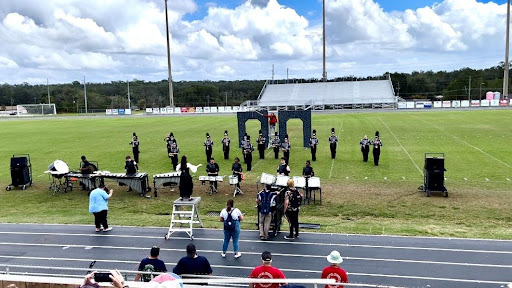by CHRISTINA OTTERSBACH
November is the climatic end for marching band season across the state of Florida. High schools strenuously practice all summer and autumn months perfecting their drills for their carefully selected musical compositions.
On November 5, District 5 area schools comprised of bands from Citrus, Hernando and Pasco County, competitively performed to demonstrate their marching and musical abilities. Out of 22 schools, four were from Hernando County: Central High School, Frank W. Springstead High School, Hernando High School and Weeki Wachee High School.
The competition was sponsored by the Florida School Music Association (FSMA), a non-profit corporation that provides oversight for interscholastic music activities for public, private, and home school students at all grade levels. FSMA membership is required for schools that wish to participate in state-recognized interscholastic music activities, which include music performance assessments.
Each school was critiqued in five areas: marching/visual performance, general effects, music, auxiliary, and percussion. They were then given a rating of either Superior, Excellent, Good, Fair, or Poor in each category and for an overall score.
You might have enjoyed some of these performances at your local high school football game, however, you might not have seen the countless hours of practice that goes into those 10-minute performances. Starting in June, students work on their marching techniques at voluntary practices. In July, during the dog days of summer, they attend mandatory band camps to rehearse 8-10 hours a day. Once school begins, students then practice 2-4 hours after school for 3-5 days a week (not including occasional practices on the weekend).
The effort put in is beyond exhausting for everyone involved – the students who must learn to balance school and practice; the parents who must be flexible with schedule changes; and the staff who dedicate countless unpaid hours to making the performance what it is. Some might argue that the requirements might be too much and not worth it, leaving some bands with few members to work with.
The journey, in contrast, makes all the effort worthwhile. Students learn how to prioritize their life to successfully manage the delicate school/work balance. In fact, research shows that students who are actively involved in music programs have better attendance and graduation rates. Students learn to persevere, overcome individual challenges, and work cooperatively as a team. Learning to read and play music also enhances the brain regions that are used in core academic subjects, such as reading and problem solving.
The most important part of the marching band journey, however, are the friendships. Band students have had the harsh reputation of being casted as odd or different, but the reason for that is clear: band is one of the safest places where students can feel free to be themselves. Music programs have a unique ability to cultivate a safe learning environment that brings out the individuality and creativity of every student – regardless of race, social, or economic status.
Students are not required to be future music majors to be a band member. Families who are financially strapped have options and help available so that all students have an equal opportunity to participate. Hernando County Schools provides food for students who are spending long hours after school practicing, as well as free instrument rental for the duration of the school year.
Now that the marching season has ended, band members will go on to participate in other musical programs, such as concert or jazz band, as well as solo & ensemble competitions. Students will eventually forget their marching song tunes and their drills, but they will never, ever forget the memories of the marching season.

Both schools received a Superior rating for their marching/visual performance.

